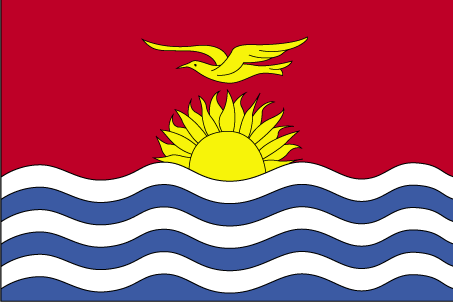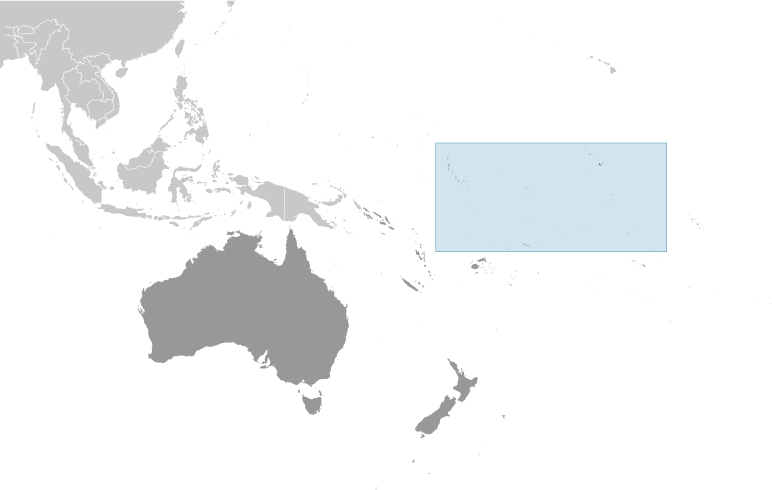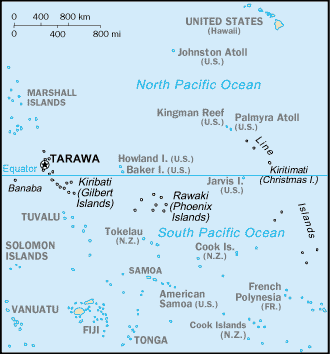The Gilbert Islands became a British protectorate in 1892 and a colony in 1915; they were captured by the Japanese in the Pacific War in 1941. The islands of Makin and Tarawa were the sites of major US amphibious victories over entrenched Japanese garrisons in 1943. The Gilbert Islands were granted self-rule by the UK in 1971 and complete independence in 1979 under the new name of Kiribati. The US relinquished all claims to the sparsely inhabited Phoenix and Line Island groups in a 1979 treaty of friendship with Kiribati.
Population
99,482 (July 2010 est.)
Country comparison to the world:194
Nationality
Noun:I-Kiribati (singular and plural)
Adjective:I-Kiribati
Ethnic groups
Micronesian 98.8%, other 1.2% (2000 census)
Religions
Roman Catholic 52%, Protestant (Congregational) 40%, other (includes Seventh-Day Adventist, Muslim, Baha'i, Latter-day Saints, Church of God) 8% (1999)
Languages
I-Kiribati, English (official)
Country Name
Conventional long form:Republic of Kiribati
Conventional short form:Kiribati
Local long form:Republic of Kiribati
Local short form:Kiribati
note: pronounced keer-ree-bahss
Former:Gilbert Islands
Government Type
republic
Capital
Name:Tarawa
Geographic coordinates:1 19 N, 172 58 E
Time difference:UTC+12 (17 hours ahead of Washington, DC during Standard Time)
Administrative divisions
3 units; Gilbert Islands, Line Islands, Phoenix Islands; note - in addition, there are 6 districts (Banaba, Central Gilberts, Line Islands, Northern Gilberts, Southern Gilberts, Tarawa) and 21 island councils - one for each of the inhabited islands (Abaiang, Abemama, Aranuka, Arorae, Banaba, Beru, Butaritari, Kanton, Kiritimati, Kuria, Maiana, Makin, Marakei, Nikunau, Nonouti, Onotoa, Tabiteuea, Tabuaeran, Tamana, Tarawa, Teraina)
Independence
12 July 1979 (from the UK)
National Holiday
Independence Day, 12 July (1979)
Constitution
12 July 1979
Legal system
English common law supplemented by local, customary law
Suffrage
18 years of age; universal
Executive branch
Chief of state:President Anote TONG (since 10 July 2003); Vice President Teima ONORIO; note - the president is both the chief of state and head of government
Head of government:President Anote TONG (since 10 July 2003); Vice President Teima ONORIO
Cabinet:12-member cabinet appointed by the president from among the members of the House of Parliament
(For more information visit the World Leaders website)
Elections:the House of Parliament chooses the presidential candidates from among its members and then those candidates compete in a general election; president elected by popular vote for a four-year term (eligible for two more terms); election last held on 17 October 2007 (next to be held in 2011); vice president appointed by the president
Election results: Anote TONG 63.7%, Nabuti MWEMWENIKARAWA 32.9%
Legislative branch
unicameral House of Parliament or Maneaba Ni Maungatabu (46 seats; 44 members elected by popular vote, 1 ex officio member - the attorney general, 1 nominated by the Rabi Council of Leaders (representing Banaba Island); members serve four-year terms)
Elections:legislative elections were held in two rounds - the first round on 22 August 2007 and the second round on 30 August 2007 (next to be held in 2011)
Election results:percent of vote by party - NA; seats by party - NA, other 2 (includes attorney general)
Judicial branch
Court of Appeal; High Court; 26 Magistrates' courts; judges at all levels are appointed by the president
Political Parties and Leaders
Boutokaan Te Koaua Party or BTK [Taberannang TIMEON]; Maneaban Te Mauri Party or MTM [Teburoro TITO]; Maurin Kiribati Pati or MKP; National Progressive Party or NPP [Dr. Harry TONG]
note: there is no tradition of formally organized political parties in Kiribati; they more closely resemble factions or interest groups because they have no party headquarters, formal platforms, or party structures
Political pressure groups and leaders
NA
International organization participation
ACP, ADB, AOSIS, C, FAO, IBRD, ICAO, ICRM, IDA, IFAD, IFC, IFRCS, ILO, IMF, IMO, IOC, ITU, ITUC, OPCW, PIF, Sparteca, SPC, UN, UNCTAD, UNESCO, UPU, WHO, WMO
Diplomatic representation in the US
Kiribati does not have an embassy in the US; there is an honorary consulate in Honolulu
Diplomatic representation from the US
the US does not have an embassy in Kiribati; the ambassador to Fiji is accredited to Kiribati
Flag description
the upper half is red with a yellow frigate bird flying over a yellow rising sun, and the lower half is blue with three horizontal wavy white stripes to represent the ocean










